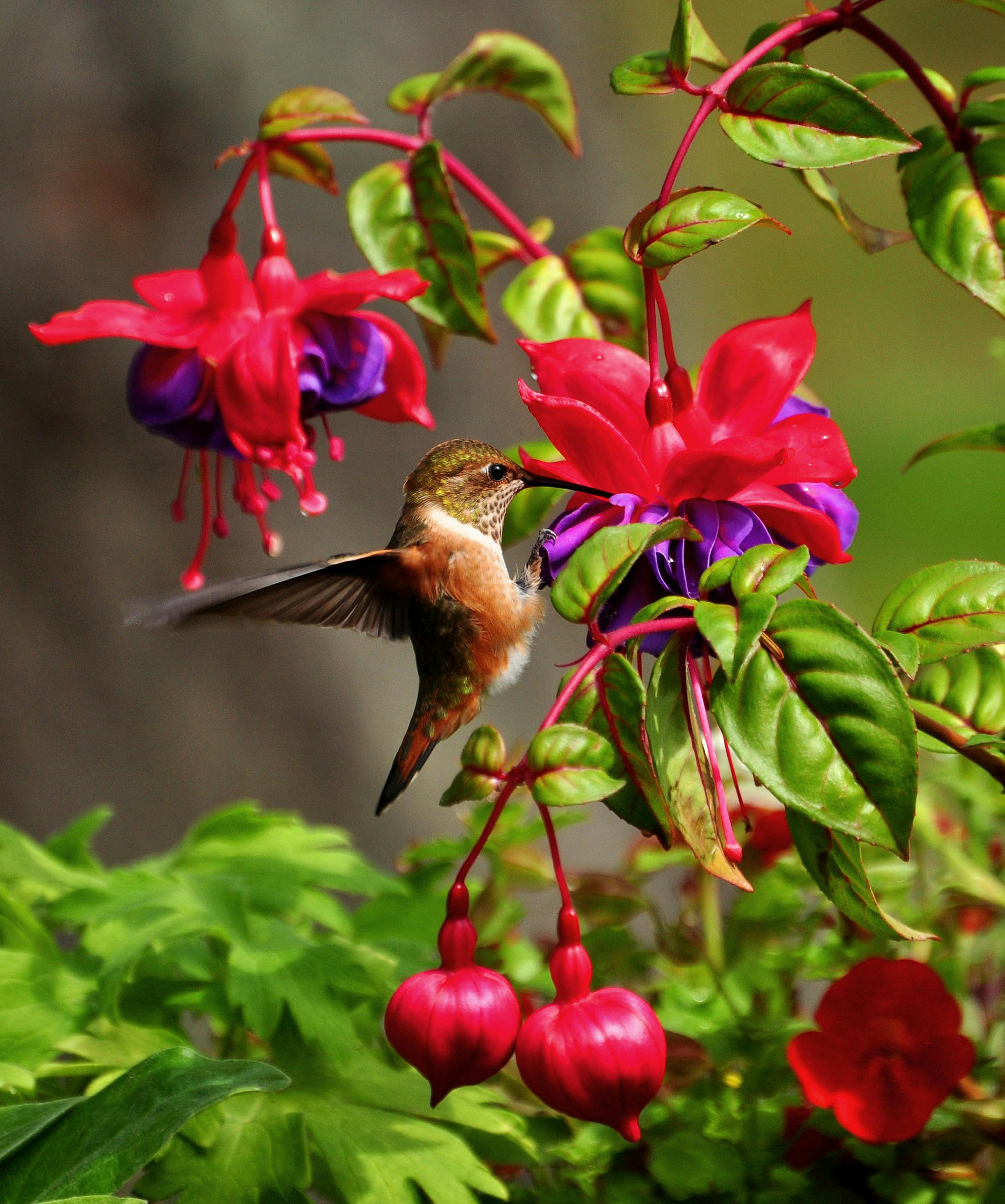Hummingbirds are among the most fascinating creatures in the avian world. Known for their vibrant colors, rapid wingbeats, and unique ability to hover, these small birds captivate bird enthusiasts and nature lovers alike. This blog explores everything you need to know about hummingbirds, from their biology to tips for attracting and caring for them in your backyard.
Introduction to Hummingbirds
Hummingbirds belong to the family Trochilidae and are native to the Americas. With over 366 species, they range from Alaska to Tierra del Fuego, though most species thrive in Central and South America. These birds are the smallest in the world, with sizes ranging from the 2-inch bee hummingbird to the 9-inch giant hummingbird. Known for their iridescent plumage and long beaks, hummingbirds primarily feed on nectar but also consume small insects for protein1.
Unique Characteristics
- Flight Abilities: Hummingbirds can hover, fly backward, and even upside down due to their rapid wing movements (up to 70 beats per second)12.
- Metabolism: They have an exceptionally high metabolic rate, requiring frequent feeding to sustain their energy levels.
- Territorial Nature: Despite their size, hummingbirds are highly aggressive and territorial, often defending their feeding areas from competitors2.
Best Practices for Attracting and Caring for Hummingbirds
1. Setting Up Feeders
- Use a sugar-water mixture (1 part sugar to 4 parts water). Avoid red dyes as they can harm birds37.
- Place feeders in shaded areas to prevent nectar from spoiling quickly.
- Clean feeders regularly with hot water or a vinegar solution to avoid mold or bacteria growth36.
2. Creating a Natural Habitat
- Plant native flowering plants like bee balm, trumpet vine, or salvia that produce nectar48.
- Include shrubs, vines, and trees for shelter and nesting.
- Avoid using pesticides or chemicals that could harm insects or birds4.
3. Providing Water
- Install drip fountains or misters as hummingbirds enjoy bathing in fine sprays of water5.
Do’s and Don’ts of Hummingbird Care
Do’s
- Change sugar water every 2–3 days during warm weather.
- Use multiple small feeders rather than one large feeder to reduce territorial disputes7.
- Monitor feeders during migration seasons to support traveling birds.
Don’ts
- Don’t use honey or artificial sweeteners in feeders; they can promote harmful bacteria growth7.
- Don’t neglect cleaning feeders; dirty feeders deter hummingbirds and can make them sick6.
- Don’t place feeders in direct sunlight for extended periods as it spoils the nectar faster3.
Common Mistakes to Avoid
- Not planting flowers around feeders: Bright blooms naturally attract hummingbirds.
- Using improper feeder placement: Ensure feeders are visible but safe from predators like cats.
- Forgetting seasonal timing: Set up feeders early in spring and keep them up until late fall for migrating species6.
Conclusion
Hummingbirds bring joy and vibrancy to any garden with their dazzling colors and lively behavior. By following these guidelines—providing clean feeders, planting native flowers, and avoiding harmful chemicals—you can create a safe haven for these incredible birds. With patience and care, you might even experience the magical moment of a hummingbird landing on your hand!
Citations:
- https://en.wikipedia.org/wiki/Hummingbird
- https://www.birdsandblooms.com/birding/attracting-hummingbirds/13-jaw-dropping-facts-about-hummingbirds/
- https://www.rainbowgardens.biz/news-events/4-best-practices-hummingbird-feeders-pollintors/
- https://abcbirds.org/blog20/hummingbird-paradise/
- https://www.wtxl.com/online_features/senior_living/do-s-and-don-ts-of-attracting-hummingbirds-and-getting/article_09eb881c-709a-5496-8598-830379894e73.html
- https://www.realhomes.com/design/hummingbird-feeder-mistakes
- https://www.allaboutbirds.org/news/feeding-hummingbirds/
- https://www.fs.usda.gov/wildflowers/pollinators/documents/HummingbirdBrochures/HummingbirdGuideEast.pdf
- https://www.audubon.org/community-science/hummingbirds/how-create-hummingbird-friendly-yard
- https://www.bobvila.com/articles/hummingbird-mistakes-to-avoid/
- https://www.birdsandblooms.com/birding/bird-species/hummingbirds-swifts-and-swallows/what-do-hummingbirds-eat/
- https://hummingbirdmarket.com/pages/care-and-rescue
- https://www.homesandgardens.com/gardens/hummingbird-feeder-mistakes
- https://nationalzoo.si.edu/migratory-birds/hummingbirds
- https://www.fs.usda.gov/wildflowers/pollinators/documents/HummingbirdBrochures/HummingbirdGuideCA.pdf
- https://www.kaytee.com/learn-care/wild-bird/hummingbird-facts
- https://www.wildernesscollege.com/hummingbird-habitat.html
- https://avianreport.com/hummingbird-facts-information/
- https://pmc.ncbi.nlm.nih.gov/articles/PMC11246024/
- https://www.wbu.com/essential-tips-hummingbird-feeders/
- https://blog.nwf.org/2018/05/four-ways-to-help-our-hummingbirds-fly-home/
- https://www.pollinator.org/learning-center/hummingbirds
- https://discoverwildcare.org/how-to-help-hummingbirds/
- https://www.birdsandblooms.com/birding/attracting-hummingbirds/tips-attracting-hummingbirds/
- https://www.birdscanada.org/feeding-and-attracting-hummingbirds
- https://www.kaytee.com/learn-care/wild-bird/common-backyard-birding-mistakes
- https://chirpforbirds.com/how-to/the-ultimate-guide-to-hummingbird-feeding/
- https://www.housedigest.com/1502576/mistakes-clean-hummingbird-feeder/
- https://pmc.ncbi.nlm.nih.gov/articles/PMC9983423/
- https://www.goodhousekeeping.com/home/gardening/g19632825/hummingbird-facts/
- https://www.fws.gov/story/hummingbirds-north-america
- https://www.fs.usda.gov/wildflowers/pollinators/documents/HummingbirdBrochures/HummingbirdGuideAK.pdf
- https://adamsfarms.com/12-hummingbird-facts/
- https://www.youtube.com/watch?v=NCdwyM0uO-4
- https://extension.unh.edu/blog/2020/01/how-attract-hummingbirds-your-yard-homeowners-experience
- https://georgiawildlife.com/hummingbirds-your-backyard
- https://www.audubon.org/designing-hummingbird-garden-15-ways-keep-them-coming









